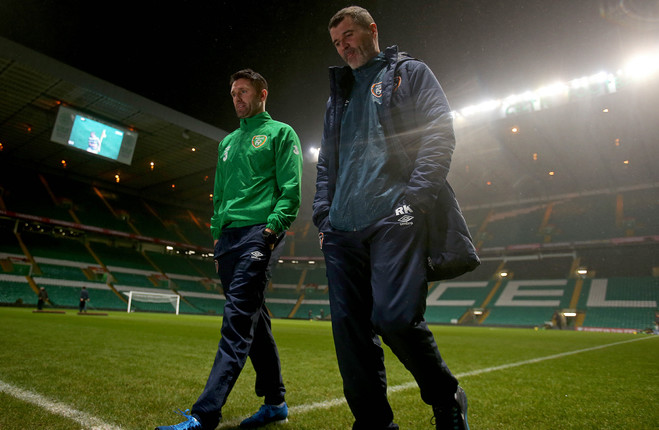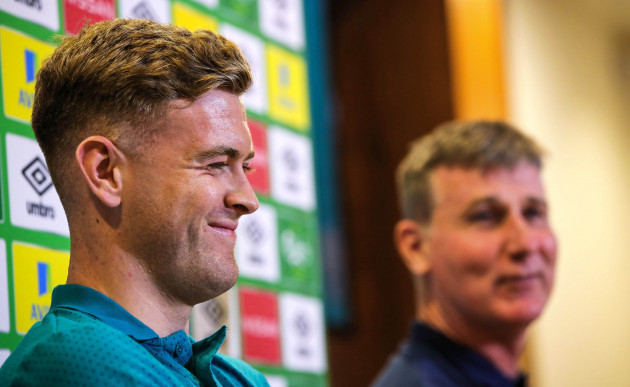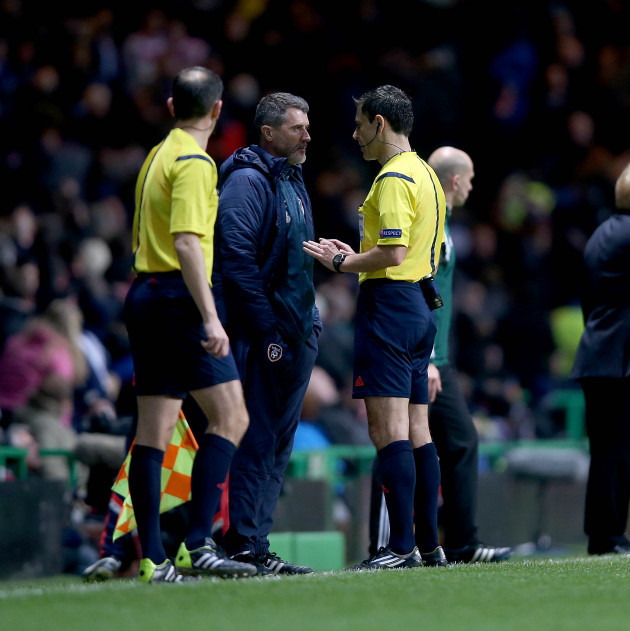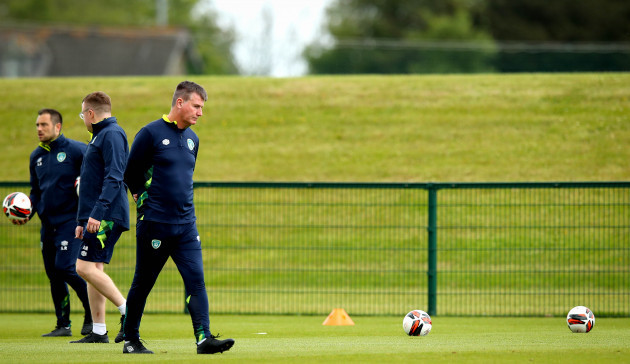KING NIDGE WAS dead, and the country was in mourning.
Love/Hate had captured the imagination for four years, quenching the nation’s bloodthirst every Sunday, and for the night of its finale on 9 November 2014 over one million viewers tuned in.
No amount of fizzy orange would help drown Trish’s sorrows.
Ladybird costumes would never be the same at Halloween.
There was a yawning gap for controversy to fill the void.
Thankfully, Roy Keane was the Ireland assistant manager, and he just so happened to be heading for Dublin the morning after Nidge met his bloody demise.
No better man to add a spark in the week-long build up to a crucial Euro 2016 qualifier away to Scotland.
On the Monday, Tuesday and Wednesday, talk was of whether Marc Wilson, James McCarthy and Glenn Whelan could win their respective fitness races.
All three would eventually miss out, but Martin O’Neill felt buoyed by the emergence of a dynamic young midfielder at Derby County. “Jeff Hendrick has been flying there,” the manager beamed.
There was some excitement about the introduction of newcomers David McGoldrick and Cyrus Christie to the squad.
Robbie Keane was 34 and had emerged from the shadow of ‘unidentified fan’ alongside David Beckham at LA Galaxy, but he was still Ireland’s leading man.
And then…
Enter Roy, stage left.
The headlines on the Thursday and the Friday morning before the game on 14 November 2014 centred around an argument with a fan at the team hotel in Portmarnock, north Dublin.
The initial reports cited Gardaí being called, the injured supporter requiring hospital treatment, and pages of Keane’s recently-released autobiography, ‘The Second Half’, being torn up and thrown in his face.
It soon emerged the fan in question was a former acquaintance of Keane, and son-in-law of the entertainer Brendan Grace.
The story grew legs.
Frank Gillespie was originally from Tyrrellspass in County Westmeath before becoming a publican in Boston.
In the late 1980s and early 90s his pub, The Blackthorn, became a refuge for Jack Charlton and his players, among them Keane, whenever they were in town.
Gillespie later released his own book, ‘Confessions from the Blackthorn’, and when he approached Keane looking for an autograph, an altercation ensued.
Gillespie ended up falling to the floor.
Keane was the one who asked for the guards to be alerted, Gillespie was on the front of national papers the following day demanding an apology, and by the end of it all the matter was taken no further by the authorities.
Front pages, phone-ins, columnists and cartoonists all had their say – leading to one national paper sketching an angry Keane in the role of Nidge.
That week, the FAI and Martin O’Neill released a statement backing Keane, Ireland then travelled to Glasgow, and Scotland won 1-0 after a quick corner kick caught the visitors napping.
That night was also the beginning of the end for Robbie Keane – dropped by O’Neill in favour of Southampton’s Shane Long.
“The biggest decision any Irish manager has made since Saipan,” Steven Reid wrote in the Irish Independent.
“To drop your captain, your talisman, your chief goal threat for a game of this nature was a massive call by Martin O’Neill.
Managers live or die by their decisions and this one backfired because in a match where we needed a goal, we didn’t have our best finisher in the box.”
It’s not even eight years ago but, as the sides prepare to meet again, it feels like a very different time for Ireland.
A very different team – and management set-up – yet so many of the same problems persist for Stephen Kenny, manager whose USP was being capable of driving change.
“We’d have liked to have worked their goalkeeper a bit more, that’s stating the obvious. Got some more crosses in, had more of a goal threat and retained the ball better,” Roy Keane said after the defeat in Glasgow.
“Have a bit more pride when you’re on it (the ball). A bit more bravery, particularly in the attacking third, be smarter. We’ve got to be a smart team.”
Two wins in 17 competitive games is a meagre return for Kenny, even allowing for the required surgery.
Eight defeats – all by just a single goal – either point to a side that is not overwhelmed by what is being asked of them and is capable of turning things around, or one which is simply too timid to respond once they fall behind.
Anger is an energy they may well need to call upon for inspiration this evening.
Kenny had just guided Dundalk to his first League of Ireland Premier Division title a couple of weeks before that Glasgow night in 2014.
It was the start of a success-laden journey at Oriel Park which would eventually lead to him becoming Ireland manager.
At the time it felt as if he was a million miles away.
Now there is a growing sense of unease that two more defeats in this Nations League campaign could see him run out of road, despite a contract to take him the next Euro qualifying campaign.
The talk around the previous meeting less than a decade ago was one of blood and thunder.
“That was like a heavyweight boxing match,” said Scotland manager Gordon Strachan after his side’s triumph. “As a pure football spectacle, it wasn’t great. But as a spectacle of two groups of players not giving an inch? Mesmerising.”
Kenny wasn’t engaging with such rhetoric yesterday. The language, the sense of what this Irish side is, feels different.
“There is a difference between tactics and style of play,” Kenny said on the eve of this game. “The style of play won’t change, we are committed to that regardless. Tactically we always have to adapt. That is a different question.
“I’m not sure in international football that there is much blood and thunder. At times it is very tactical now but there will obviously be a physical element.
“We have a full house, this is our home, the Aviva Stadium, and we want to perform and play to the best of our ability and give them something to be proud of.”
He must hope it doesn’t come before another fall.




